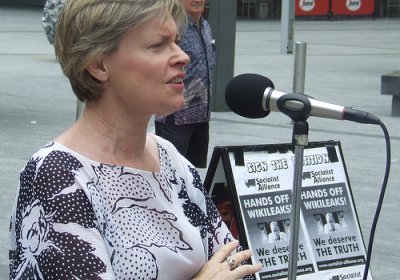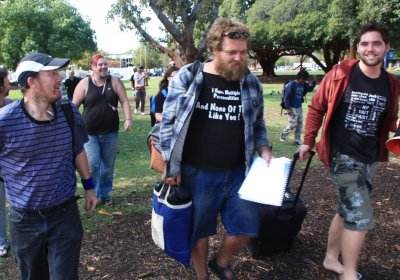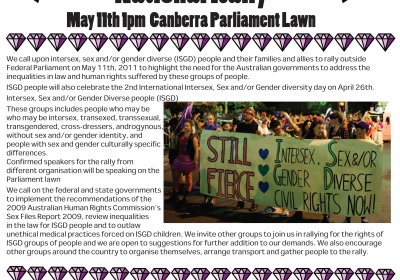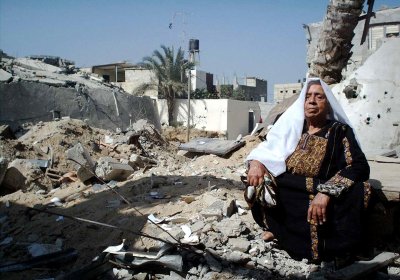“Of the 339 recommendations of the royal commission into black deaths in custody handed down in 1991, the first people to receive funding were the police and prisons,” Murri community leader Sam Watson told an April 15 rally to commemorate the 20th anniversary of the commission.
“The big bucks went to the cops and the jails. Aboriginal legal services and other Indigenous organisations only got the crumbs. Instead of decreasing the rate of incarceration of Aboriginal people, that rate has increased over the past 20 years in Australia."
The rally and march attracted about 100 protesters.
Australia
Twenty five people joined a demonstration organised by homeless people to protest plans by the Western Australian government to remove homeless people from the city during the Commonwealth Heads of Government Meeting (CHOGM) in October. on the street.” A parliamentary debate on April 7 revealed that homeless people would be directed away from CHOGM security areas in the city. Protesters were upset the government wanted to keep them out of sight during the CHOGM summit without doing anything to tackle homelessness.
“Coal is really dirty. Gas is pretty dirty too. It's a bit cleaner than coal,” said City of Sydney CEO Monica Barone as she explained the plan to move to gas-powered energy production at a packed community meeting at St Peters Town Hall organised by Sydney Residents Against Coal Seam Gas (SRACGS) on April 13.
Barone agreed that we need to move to a low carbon economy, but said moving to a zero carbon economy, such as the plan set out by Beyond Zero Emissions, would be “enormous”.
About three hundred and forty climate activists, from more than 100 community climate action groups, attended Australia's Climate Action Summit in Melbourne from April 9-11.
Some of the key topics discussed were: a carbon price; fossil fuels such as coal, gas and coal seam gas; working with unions; building a people's power movement; renewable energy campaigns and; bridging the gap between science and politics.
The activists of the Still Fierce collective are angry, proud and determined to make change happen.
The group is organising a protest outside the federal parliament in Canberra on May 11. It will be Australia’s first rally for the rights of intersex, sex and/or gender diverse (ISGD) people.
On its website, Still Fierce says ISGD “includes people who may be intersex, transexed, transsexual, transgender, genderqueer, androgynous, without sex and/or gender identity, and people with sex and gender culturally specific differences”.
Environmentalist Bob Irwin, father of the late “Crocodile Hunter” Steve Irwin, said he will continue to protest against the coal seam gas (CSG) industry despite his arrest at a protest on April 12.
Police detained Irwin along with Queensland Greens spokesperson Libby Connors and Queensland Party MP Aiden McLindon at a protest organised by Lock the Gate at Tara, 300 kilometres west of Brisbane.
They were charged with disobeying a police direction. They will appear in court in May.
The question of refugees "is as fundamental a human rights issue as there is", former senator and refugee campaigner Andrew Bartlett told a rally of around 100 in Brisbane on April 9. The rally was organised by the Refugee Action Collective (RAC).
Bartlett said refugees "are among the most vulnerable people on Earth. Forcing them to return home to danger is effectively sending them to their deaths.”
Opposition to the Brighton bypass bridge over the Jordan River in southern Tasmania escalated after the April 12 decision by the Tasmanian heritage minister Brian Wightman to give final approval for works to proceed.
The bridge will destroy kutalayna, a site of 42,000 years of Aboriginal occupation.
On April 14, protesters entered the site and stopped the works. On April 15, 21 people were arrested after protesters scaled the fence and entered the site in waves, stopping the work on several occasions.
Steel manufacturer BlueScope is exaggerating the impact of a carbon price said the April 9 Sydney Morning Herald.
“Last month BlueScope said a carbon price of $25 a tonne would wipe $300 million to $400 million off its bottom line but analysts at Deutsche Bank quickly pointed out that ignored compensation," SMH journalist Paddy Manning said.
“Based on BlueScope's 2009-10 emissions of 12.2 million tonnes, they calculated the company's carbon liability in 2012-13 would be about $30.5 million, or 7.4% of its forecasts for the company's net profit after tax."
One hundred and thirty people packed out a room in the Crowne Plaza hotel to hear traditional owners and nuclear experts call for the closure of the Ranger uranium mine in the world heritage-listed Kakadu national park.
Yvonne Margarula condemned the mine for its presence on land that is sacred to her people — the Mirrar people. “The promises never last,” she said. “But the problems always do.”
Residents on Camp Road, Broadmeadows, were surprised to see 300 people marching down their street on April 2, calling for an end to the mandatory detention of asylum seekers. The march ended with a rally at the Broadmeadows detention centre, known as Melbourne Immigration Transit Accommodation.
About 150 young asylum seekers between the ages of 13 and 17 are held in this centre. All of them are unaccompanied: meaning that they have no families with them.
While Palestinian, Israeli and international non-violent protesters who march against Israel’s policies in the Occupied Territories are literally showered in sewage, beaten, arbitrarily arrested and sometimes killed by Israeli forces, the battle against non-violent resistance has taken its own ugly form in Australia.
- Previous page
- Page 831
- Next page










